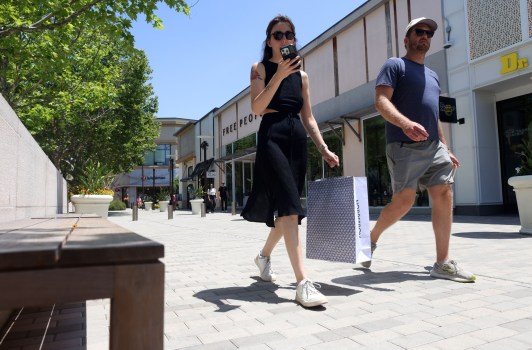Any time you spend two hours in Walnut Creek, local business leaders may be tracking you. The city’s Chamber of Commerce has paired with a tech company to clock visitors as they move in and out of the city.
The technology is from Arrivalist, a travel-industry-focused company with a platform that uses mobile location datasets to provide the Walnut Creek Chamber of Commerce and Visitor Bureau with data on consumer behavior and market trends. The company collects information from cell towers, WiFi routers and other sources to track the location of mobile devices.
Though the platform is being used by cities in the southern U.S., and other cities in Calfornia such as Stockton and Sonoma, Walnut Creek appears to be the first city in the greater Bay Area to employ it.
RELATED: How to stop Walnut Creek Chamber of Commerce partner from cyber tracking you
The Walnut Creek chamber says it’s working with the company in an attempt to determine how tourists spend their time in the city – and in the hopes it will help them attract more visitors, filling the roughly 1,300 rooms across eight hotels. The newest addition is the Hilton Garden Inn that just opened last year.
Currently, the city faces a deficit unless it can increase revenue or find more creative solutions. Local economic leaders say increased hotel stays will generate crucial fees to aid their budget woes.
In a meeting on Tuesday night, the business association’s reps showed how they had tracked participants of the Bay Area Spring Classic grade-school girls’ basketball tournament in early May; they received data on how many people came to the tournament, which cities or states they originated from, and how many nights they stayed.
Nicole Hankton, executive vice president of the Chamber’s visitor’s bureau, said the data is anonymous. No demographic details, names, phone numbers or addresses are included, she said. The Chamber can set up “points of interest” to track traffic for specific locations or events – like the Bay Area Spring Classic – to inform future marketing efforts.
“There’s no app download,” said Hankton. “We don’t get an email. We look at a specific event and get an estimate of how many people went.”
The Chamber, which operates as a nonprofit business association, directed all questions about privacy laws to Arrivalist. The company declined to provide a comment. However, Joseph Zitz, Arrivalist’s director of partnerships who helps service the Walnut Creek Chamber of Commerce’s account, said he sees their work as a “white hat” operation, trying to improve the quality of life for residents of tourist destinations such as Walnut Creek.
Zitz said the company provides only general insights to anonymous, “aggregated movement.”
Though Arrivalist says it follows California privacy law, the San Francisco-based company’s privacy policies also includes numerous and broad legal exceptions that present barriers for people trying to rein in their data, such as reserving the right to deny deletion requests when they involve local law enforcement, court orders or “as necessary or appropriate to protect the rights, property or safety of us, our clients or others.”
None of this was mentioned during Tuesday’s meeting.
But it concerns privacy advocate Mike Katz-Lacabe, the director of research for Oakland Privacy, a citizen coalition focused on issues of surveillance, transparency and privacy.
“It’s just incredible how much data there is, and the ability to basically track you from your home to everywhere that you go,” said Katz-Lacabe. “It’s not that hard to establish, if someone has this data, the exact patterns of your life, where you shop, where you work, where you worship, who your friends are, who you spend time with, where you spend the night, your travel habits — it’s absolutely everything. Of course, different companies like the Walnut Creek Chamber of Commerce are interested in a very small portion of that, which is pretty much benign. But it’s still perhaps a little bit creepy.”
On Tuesday, Hankton insisted the data collection is “all very innocent.” She said this kind of data is Chamber’s best option for improving tourism.
“I totally understand people’s concerns, but all we are looking at is location data,” she said. “It’s only the phones that they can track, and then we sort of multiply it.”
For Katz-Lacabe, the problems with the city’s data collection tie into a much larger issue.
“I think the ultimate problem is that we don’t have a national privacy law that protects our personal information right, including information about where we are, location data,” he said. “That would make this problem go away.”

